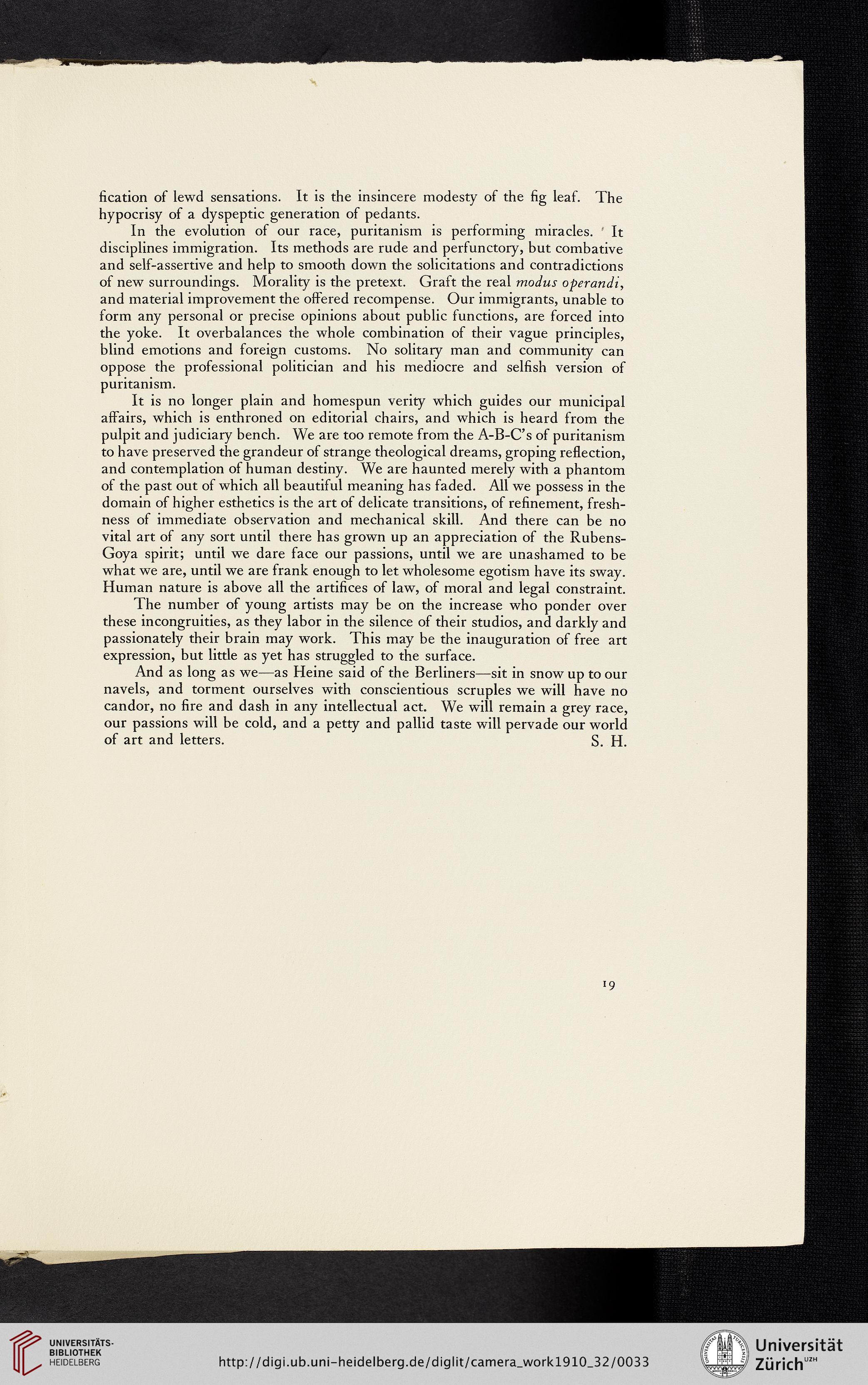Für diese Seite ist auch eine manuell angefertigte Transkription bzw. Edition verfügbar. Bitte wechseln Sie dafür zum Reiter "Transkription" oder "Edition".
fication of lewd sensations. It is the insincere modesty of the fig leaf. The
hypocrisy of a dyspeptic generation of pedants.
In the evolution of our race, puritanism is performing miracles. It
disciplines immigration. Its methods are rude and perfunctory, but combative
and self-assertive and help to smooth down the solicitations and contradictions
of new surroundings. Morality is the pretext. Graft the real modus operandiy
and material improvement the offered recompense. Our immigrants, unable to
form any personal or precise opinions about public functions, are forced into
the yoke. It overbalances the whole combination of their vague principles,
blind emotions and foreign customs. No solitary man and community can
oppose the professional politician and his mediocre and selfish version of
puritanism.
It is no longer plain and homespun verity which guides our municipal
affairs, which is enthroned on editorial chairs, and which is heard from the
pulpit and judiciary bench. We are too remote from the A-B-C’s of puritanism
to have preserved the grandeur of strange theological dreams, groping reflection,
and contemplation of human destiny. We are haunted merely with a phantom
of the past out of which all beautiful meaning has faded. All we possess in the
domain of higher esthetics is the art of delicate transitions, of refinement, fresh-
ness of immediate observation and mechanical skill. And there can be no
vital art of any sort until there has grown up an appreciation of the Rubens-
Goya spirit; until we dare face our passions, until we are unashamed to be
what we are, until we are frank enough to let wholesome egotism have its sway.
Human nature is above all the artifices of law, of moral and legal constraint.
The number of young artists may be on the increase who ponder over
these incongruities, as they labor in the silence of their studios, and darkly and
passionately their brain may work. This may be the inauguration of free art
expression, but little as yet has struggled to the surface.
And as long as we—as Heine said of the Berliners—sit in snow up to our
navels, and torment ourselves with conscientious scruples we will have no
candor, no fire and dash in any intellectual act. We will remain a grey race,
our passions will be cold, and a petty and pallid taste will pervade our world
of art and letters. S. H.
9
hypocrisy of a dyspeptic generation of pedants.
In the evolution of our race, puritanism is performing miracles. It
disciplines immigration. Its methods are rude and perfunctory, but combative
and self-assertive and help to smooth down the solicitations and contradictions
of new surroundings. Morality is the pretext. Graft the real modus operandiy
and material improvement the offered recompense. Our immigrants, unable to
form any personal or precise opinions about public functions, are forced into
the yoke. It overbalances the whole combination of their vague principles,
blind emotions and foreign customs. No solitary man and community can
oppose the professional politician and his mediocre and selfish version of
puritanism.
It is no longer plain and homespun verity which guides our municipal
affairs, which is enthroned on editorial chairs, and which is heard from the
pulpit and judiciary bench. We are too remote from the A-B-C’s of puritanism
to have preserved the grandeur of strange theological dreams, groping reflection,
and contemplation of human destiny. We are haunted merely with a phantom
of the past out of which all beautiful meaning has faded. All we possess in the
domain of higher esthetics is the art of delicate transitions, of refinement, fresh-
ness of immediate observation and mechanical skill. And there can be no
vital art of any sort until there has grown up an appreciation of the Rubens-
Goya spirit; until we dare face our passions, until we are unashamed to be
what we are, until we are frank enough to let wholesome egotism have its sway.
Human nature is above all the artifices of law, of moral and legal constraint.
The number of young artists may be on the increase who ponder over
these incongruities, as they labor in the silence of their studios, and darkly and
passionately their brain may work. This may be the inauguration of free art
expression, but little as yet has struggled to the surface.
And as long as we—as Heine said of the Berliners—sit in snow up to our
navels, and torment ourselves with conscientious scruples we will have no
candor, no fire and dash in any intellectual act. We will remain a grey race,
our passions will be cold, and a petty and pallid taste will pervade our world
of art and letters. S. H.
9


